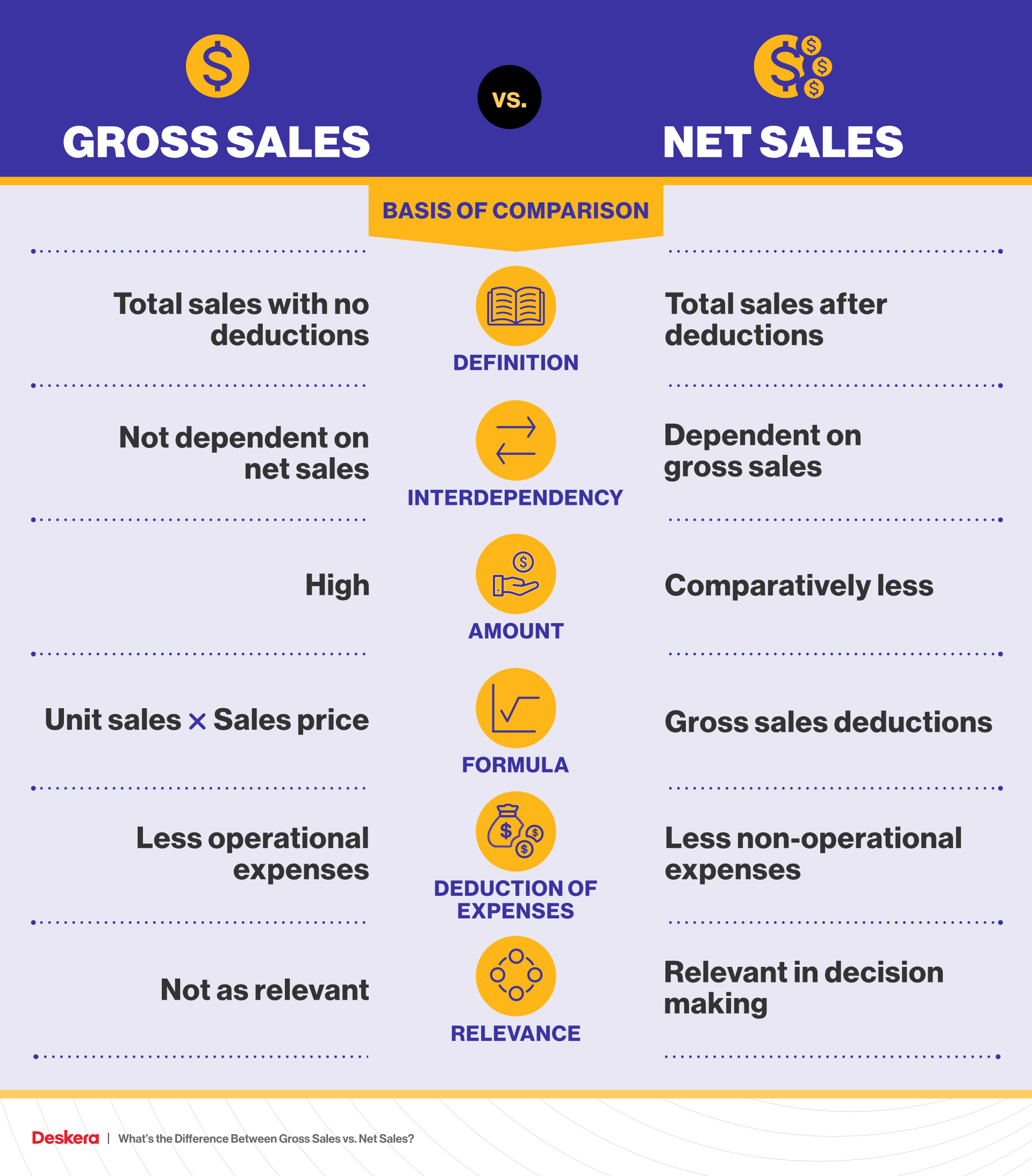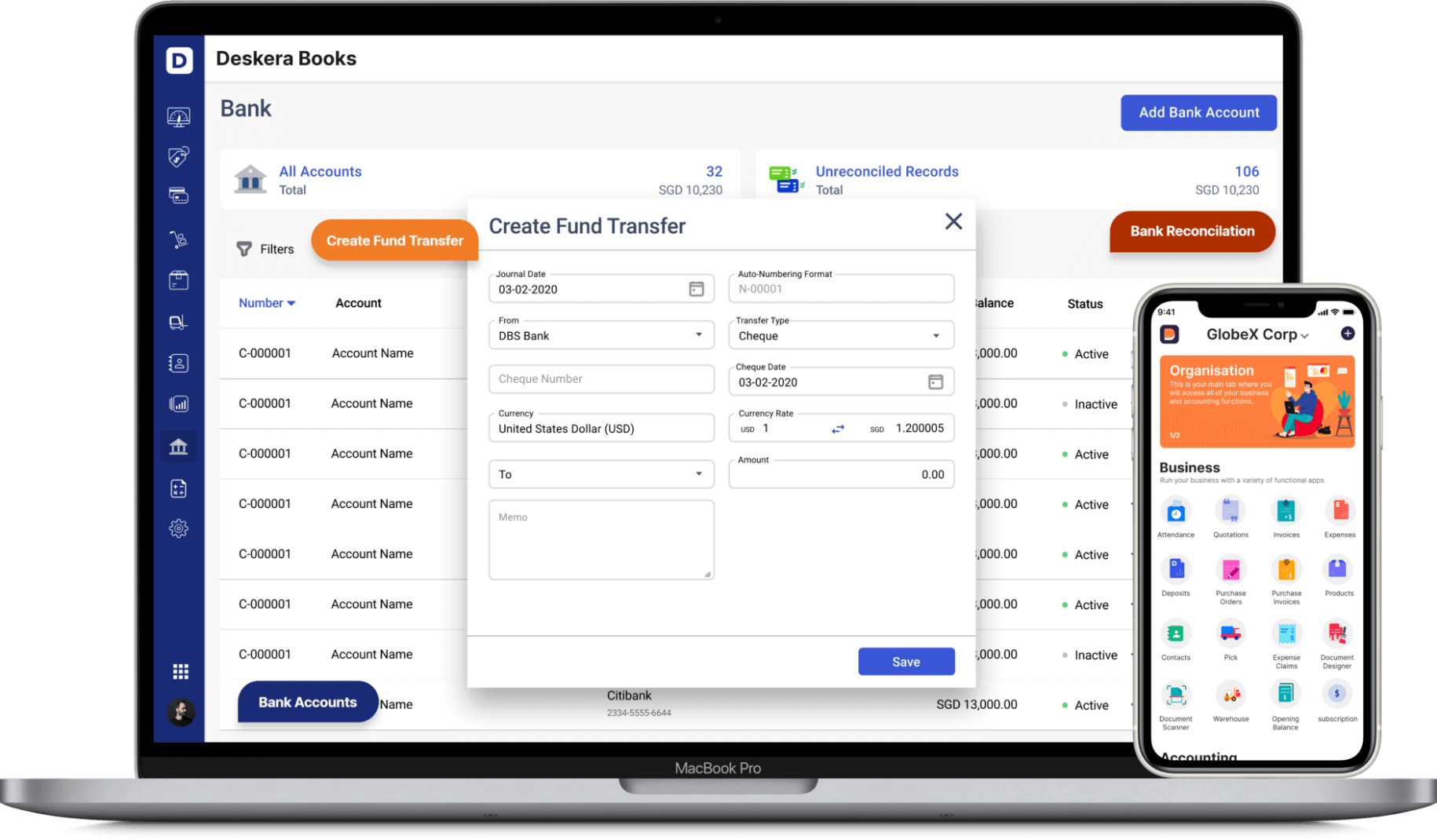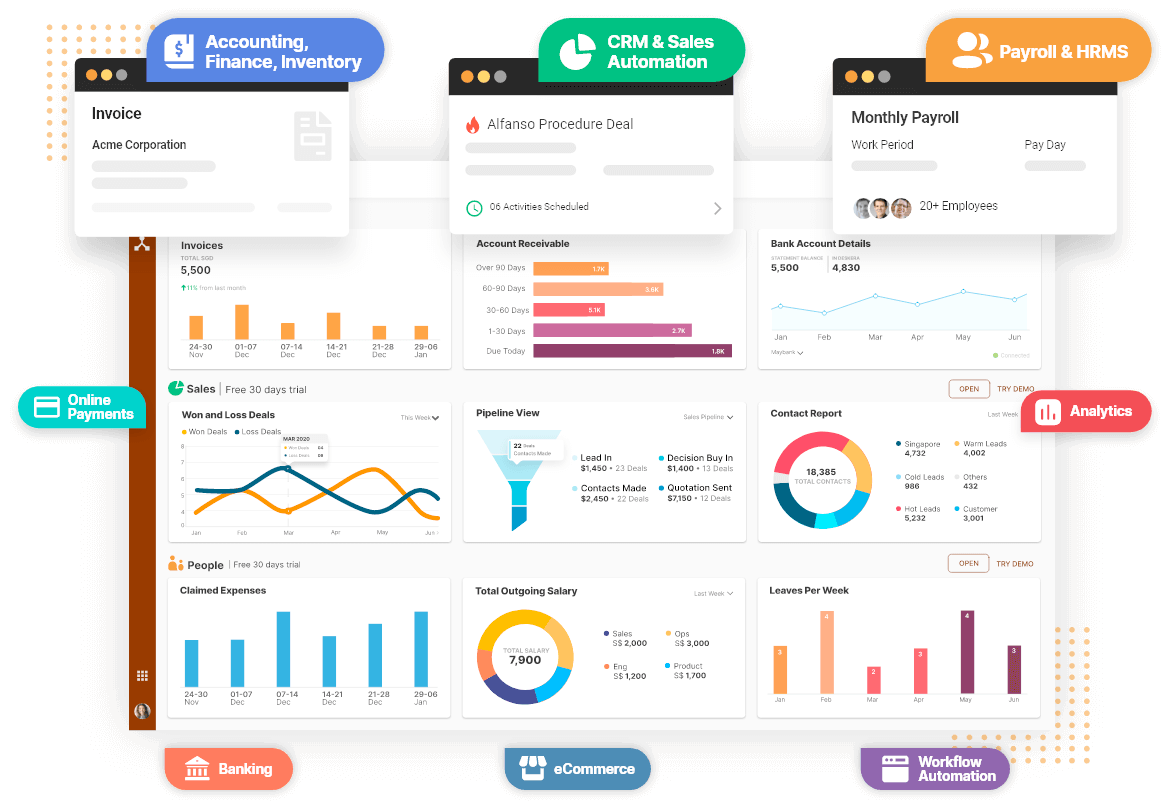Net sales and gross sales are terms that may be more familiar to investors and accountants. Knowing what these mean as a sales manager or a salesperson can indicate business performance and help you identify any issues before they become a serious problem.

By understanding gross sales vs. net sales and tracking how the figures change over time, you can see what is holding your sales back and review your processes to improve performance across the business, including your sales process.
With ERP.AI, businesses can automate the tracking of sales data, uncover hidden patterns, and generate real-time insights that help refine strategies, reduce revenue leakage, and boost overall profitability.
In this article, let us go more into details about gross sales and net sales. Understanding the distinction between net sales and gross sales can help you interpret sales data and make better decisions.
Gross Sales vs. Net Sales
Gross sale is the value of all of a business’s sales transactions over a specified period of time without accounting for any deductions. Meanwhile, net sales are a company’s gross sales minus three kinds of deductions: allowances, discounts, and returns.

What are Gross Sales?
The gross sale refers to the total amount of all sales receipts added in together that reflects the unadjusted amount of sales income that a person or company makes within a certain period of time. The gross sales include any sales transactions that generate revenue and exclude all costs, expenses, and other charges.
The gross sales provide an overview of a company’s income to create a baseline to help and measure the impact of deductions and costs. Gross sales can primarily function as a starting point to calculate other finances because they focus on the direct relationship between income and transactions.
Gross sales can be an important tool. They can be used specifically for stores that sell retail items. However, it is not the final word of a company’s revenue. Gross sales is the reflection of the total amount of revenue a business brings in during a certain period of time. However, it does not account for all of the expenses accrued throughout the process of generating the products that have been sold. Gross sales is usually typically listed on an income statement or often listed as total revenue.
What are Net Sales?
The income statement is the financial report that is used while analyzing a company’s operational expenses, revenues, and revenue growth.
Your company’s income statement is broken out into three parts that support the analysis of capital costs, direct cost, and indirect cost. The direct costs portion of the income statement is where the net sales can be found.
Net sales is the amount of revenue a business earns after accounting for all the relevant expenses and deductions. Net sales provides a complete idea of how much a business spends and earns through the sales process. They are key figures that financial analysts use to understand the overall financial health and business income.
A business’s net sales figure indicates how much the company made from doing business over a certain period of time, allowing the stakeholders to make future financial decisions based on the success of their current sales strategy.
Net sales are defined as gross sales subtracted from the following three deductions:
- Sales returns: A refund that is granted to customers if they return goods to the company. For many reasons, from late deliveries to damaged goods, the customer may decide to send the item back and demand a refund, and this is a cost you have to consider when calculating net sales. The refund amount would need to be deducted from the gross sales.
- Sales discounts: Businesses generally take this approach if they are in urgent need of cash. A payment discount, such as paying 2% less if the buyer pays within 10 days of the invoice date. The seller doesn’t know which customers will take the discount at the time of sale. Hence, the discount is typically applied upon receiving the receipt of cash from customers.
- Sales allowances: It is the reduction in the price paid by a customer due to minor product defects. A seller grants a sales allowance to the buyer after the buyer has purchased the items in question.When there is an minor issues with the delivered product but it is still usable, the customer and seller might agree to a compromise with a partial refund against the paid invoice.
In total, these deductions are the difference between net sales and gross sales. If the company does not record sales allowances, sales returns, or sales discounts, there is no difference between net sales and gross sales.
All three of the deductions are considered as contra accounts. This means that they have a natural debit balance as opposed to the natural credit balance for the sales account.
The main difference between net sales and gross sales can be of interest to an analyst. If the difference between both figures is gradually increasing over time, it can indicate quality problems with products that are generating unusual allowances and large sales returns.
Calculating your Net Sales vs. Gross Sales
Let us look at the formula and ways to calculate net and gross sales:
How to calculate gross sales:
Formula:
Gross sales = Number of units (gross sales price) * Unit price/cost
As defined, gross sales is simply the sum of all sales made. You can just multiply the number of units you have sold by the unit price. So, if you have sold 100 units in first quarter, and the unit price is $50, your gross sales revenue (also called gross profit) for that quarter equals $5,000.
How to calculate net sales:
Net income or net sales is sightly more complicated to calculate, as you need to know all of the deductions that have been applied to your sales.
Formula:
Net sales = Gross sales - Deductions
Gross sales (total revenue) – Allowances – Discounts – Sales returns = Net sales
The three specific types of deductions as mentioned above are - discounts, returns and allowances. Let us look at each with examples.
For example, your company can send a customer an invoice for $6,000 to be paid within 30 days. However, you could offer a sales discount where they can get around 2% off if they pay within the next 10 days (this particular offer would be known as a 1/20 net 10 in discount terms). In that case, the customer needs to pay $4,900, getting a $100 discount for early payment.
If your gross sales for Q1 is $9,000, but over the same period of time, there were $600 in sales discounts—$250 in sales returns and $150 in sales allowances—these would need to be deducted from the total amount. This would give you a figure of $8,000 net sales vs. a gross sales figure of $9,000.
Benefits of Gross Sales and Net Sales
Terms like net sales and gross sales are more commonly associated with companies selling physical goods, where deductions occur due to allowances and customer returns are more likely to occur.
Run competitive analyses
Other than a general indication of a business’s financial health, net sales can also be used as a benchmark to compare with other companies of the same industry.
If your net sales numbers are consistently higher, it shows that you are doing something right and you can focus on your strengths and company growth.
If your net sales figure is significantly lower than your competitor’s figures, it indicates there is a problem, and your company needs to investigate why.
Better decision making
A key part of sales forecasting involves setting a realistic budget. As the net sales take into account the costs directly arising from the sales process, more business owners use this figure to guide their decision-making process.
If you base your budget on gross sales only, you may plan to take decisions like producing more stock, only to learn that the net sales figures are too low. This could damage your plans and force you to relook at your sales plan in a way that leads to decreased efficiency.
Avoid misleading figures
It is tempting to rely on gross sales as a measure of performance as it is always going to be higher or equal than the net sales. It can be misleading.
A high gross sales figure may look impressive; however, if you have had to refund most of those sales, then it is deceptive in nature. It can lead to incorrect sales forecasting and planning.
However, gross sales can be trusted, but you should be approached with cautious optimism.
Motivate your sales team
Using the gross and net sales as common key performance indicators (KPI), you can hold your sales representative accountable for the company’s growth and sales.
You can dig deeper and analyze your top-performing sales teams to find out if their gross sales is closer to the net sales and if the team is actually bringing in valuable deals.
Knowing these numbers could help you set the correct gross sale KPIs with good qualified leads. This forces your sales team to focus on high-budget and high-quality deals in tandem, hence motivating them.
How AI Transforms Sales
AI revolutionizes sales by enabling smarter lead generation, personalized outreach, and data-driven decision-making. It helps sales teams identify high-potential leads through predictive analytics, using behavioral data and purchase history to forecast which prospects are most likely to convert.
AI-powered tools like chatbots and virtual assistants automate initial interactions, qualify leads, and handle repetitive tasks, freeing up sales reps to focus on closing deals. With AI-powered platforms, businesses can integrate sales data across departments, align efforts, and drive more consistent revenue growth.
How Can Deskera Help With Your Business?
Deskera is a cloud system that brings automation and therefore eases business functioning. It reduces the admin time while also increasing efficiency. Deskera Books can be especially useful in improving cash flow and budgeting for your business.
One of its usability lies in creating invoices on behalf of your business that can be sent out immediately. You can also set reminders with the invoices that are not being paid out with the help of Deskera Books.
It reduces the admin time while also increasing efficiency. Deskera Books can be a blessing in disguise if you want to improve your cash flow and budgeting for your business.
You can have access to Deskera's ready-made Profit and Loss Statement, Balance Sheet, and other financial reports in an instant.

Deskera is the best platform for managing your financials and budgets. Be it invoicing, inventory, CRM, accounting, or HR & payroll, Deskera can help you in every aspect.

Key Takeaways
- Gross sales, which is the sum of all sales made with no deductions and before discounts or returns
- They are generally only significant to companies that operate in the consumer retail industry
- Net sales, which is gross sales with deductions (discounts, returns, and allowances) included
- If the net sales are externally reported, they will be notated in the portion of the direct costs of the income statement
- Changes in the net sales will affect the company’s gross profit and gross profit margin, but net sales do not include (cogs) costs of goods sold
- It is helpful to plot gross sales and net sales together on a graph to determine the company trend
Related Articles











